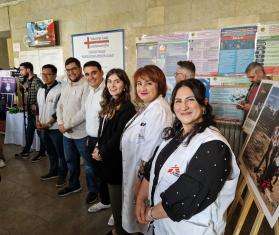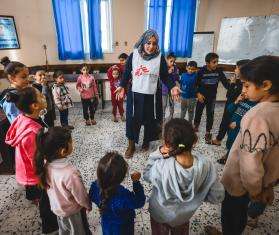Médecins Sans Frontières/Doctors Without Borders (MSF) calls on Roll Back Malaria to acknowledge that the global malaria strategy is badly faltering
March 31, 2005, Geneva/New York — Doctors Without Borders/Médecins Sans Frontières (MSF) is gravely disappointed that donor governments, WHO, UNICEF, and the Global Fund, who are meeting this week at the Roll Back Malaria Partnership board meeting, are refusing to admit that the global malaria strategy has hit a brick wall.
In April 2001, WHO issued recommendations that encouraged malaria endemic countries to move to more effective malaria medicines since the most virulent forms of malaria had become resistant to older drugs in the vast majority of countries using those drugs.
The bold new strategy was to switch from these failing treatments to artemisinin-based combination therapy, or ACT. Replacing older drugs with ACT will save the lives of children and adults that suffer from severe malaria. The WHO estimates that up to two million people die from malaria each year and that every thirty seconds a child dies of malaria in Africa.
On appearance, the move toward more effective malaria drugs seems to be a great success - more than fifty countries have decided to switch to ACT. But there is a slight complication.
Approximately nine of the 33 African countries that have decided to change have access to ACT and have actually started using these more effective malaria treatments.
So, in actual fact the vast majority of countries are continuing to use drugs that no longer work. People are continuing to die because the international community has failed to sufficiently roll out this new strategy.
Since 2003, MSF has been warning of impending drug shortages but the response has been a series of failures. In March 2004 all stakeholders agreed to work toward securing the market and UNICEF agreed to take the lead in organizing pre-purchase of drugs. But UNICEF has so far failed to act. The Global Fund also agreed to attempt to pool country orders but no action has been taken to date.
The problem is especially acute because of the failure of the Novartis/WHO 2001 agreement on supplying the drug Coartem. Although Novartis had agreed to "all reasonable efforts" to produce quantities according to WHO forecasts, they have failed to fulfill this commitment and instead are rationing extremely limited quantities.
All the UN-validated ACT suppliers - Cipla (India), IPCA (India), Sanofi (France), and Novartis (Switzerland) - have said that they require guaranteed orders before producing the large quantities of drugs needed by countries.
On April 1st, the underfunded, loosely defined Roll Back Malaria Partnership will consider a proposal to do competitive tenders for large quantities of ACTs. But they have not yet worked out where the money will come from. Donors have not yet responded.
Will the donors and Global Fund work out financing for pre-purchase of these desperately needed drugs, or will people with malaria continue to die from UNICEF/Global Fund inertia?



